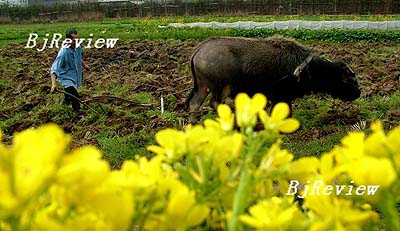|

Lu Gensheng comes from a remote mountainous area in southwest China's Sichuan Province. Now a construction worker, Lu originally raised grain on 0.2 hectare of land. A few years ago, Lu planted cypress trees in line with a government policy converting farmland to forest in the central and western parts of the country. The project was meant to tackle environmental problems by increasing overall forest coverage in China.
According to the government policy, farmers who adopted the program get 300 yuan and 750 kg of grain per hectare annually depending on the type of trees they planted. Those planting economically beneficial plants, such as fruit producing trees, were subsidized for five years and those who planted ecologically friendly trees were subsidized for eight years. Currently, most of the able-bodied workers in Lu's area left town for other jobs, leaving only the elderly to tend to the trees.
Next year, Lu expected his 300-yuan subsidy to end. Since he planted ecological trees, he received eight years of subsidies and he got 900 yuan per hectare more than those who planted fruit trees. But he's having second thoughts about whether it was worthwhile or not. "I can get 900 yuan more in subsidies," Lu said. "But look at those planting fruit trees. They can sell the fruits and earn much more than I can in just three years."
What Lu did not know at the time was that the government has promised to continue to subsidize the farmers for another five or eight years, respectively, though the grain subsidy will be cut in half. From next year on, this means Lu will get another eight years of subsidies.
The decision is part of a new policy, published on September 10, to amend the farmland-to-forest project. The main aim of the new policy is to halt the conversion of farmland to forest due to the fact that farmland throughout the country has been severely reduced in recent years.
This sudden change in policy has caught the public by surprise. According to statistics from the Ministry of Land and Resources, over 733,000 hectares of farmland was converted to forest annually from 1996 to 2005, accounting for 60 percent of annual reduction in farmland. The area of farmland was 122 million hectares by the end of 2006, reaching the country's bottom line of farmland requirement at 120 million hectares.
From few to many
The farmland-to-forest project is by far the biggest ecological construction project with the largest investment and involvement in China's history. It started in 1999 and has cost the government over 4.3 trillion yuan.
After major flooding along the Yangtze River and Songhuajiang River in 1998, ecological problems in northwest and southwest China became pressing. At that time, grain output in China had been increasing each year up to an annual output of over 500 billion kg. Because of this, farmers had been greatly hurt by cheap grain prices.
Policy-makers at that time believed turning farmland into forest to protect the fragile ecological environment would be of great benefit. Meanwhile, the government would subsidize farmers with the excessive grain reserves. More importantly, the thought was that developing ecological forests and fruit tree crops could help advance the rural economic structure and increase farmers' income.
"We must be determined to restore the green coverage in the middle and upper parts of the Yangtze River and the Yellow River, and preserve the ecological environment," then Premier Zhu Rongji declared in 1999. "We must make this our primary achievement in five years and a major achievement in 10 years."
Because of heavy agricultural taxes and the cheap price of grain, the farmers responded actively to the policy. The more trees they planted, the more subsidies they would get.
In 1999, trial phases of the farmland-to-forest project were carried out in three provinces: Sichuan, Gansu and Shaanxi. In 2000, the policy spread to 13 provinces in the upper areas of the Yangtze River and Yellow River. By 2007, the farmland-to-forest project had been carried out in 25 provinces and had involved 124 million farmers.
Eight years after the project began, farmland converted to forest accounted for over 60 percent of all newly planted trees nationwide, and registered as high as 90 percent in many western regions. So far, about 24 million hectares of farmland has been reforested.
The project has indeed improved the natural environment in China. Statistics from the State Forestry Administration show that forest coverage in the areas where the project was carried out increased by 2 percentage points. In Inner Mongolia, the figure was nearly 4 percentage points and in Yan'an in Shaanxi Province, as high as 25 percentage points.
Meanwhile, grain and monetary subsidies have become important sources of income for farmers involved in the project. Figures from the Ministry of Land and Resources show that compensation and subsidies accounted for 10 percent of the income for farmers involved.
Reduction in farmland
Lu's village is an epitome of Chinese villages affected by the reforestation policy.
| 